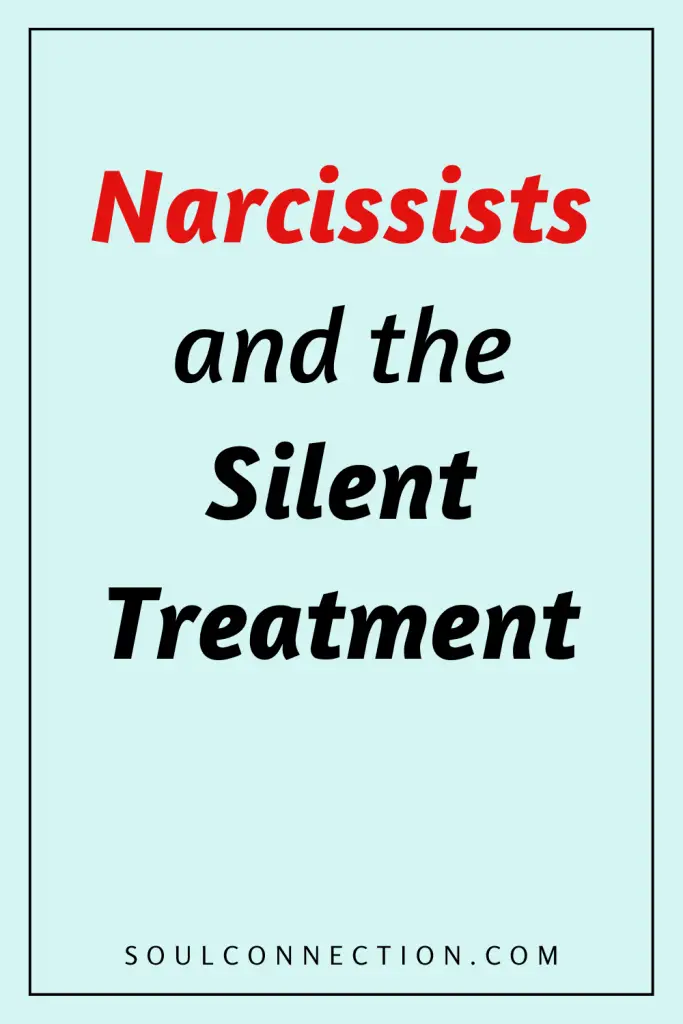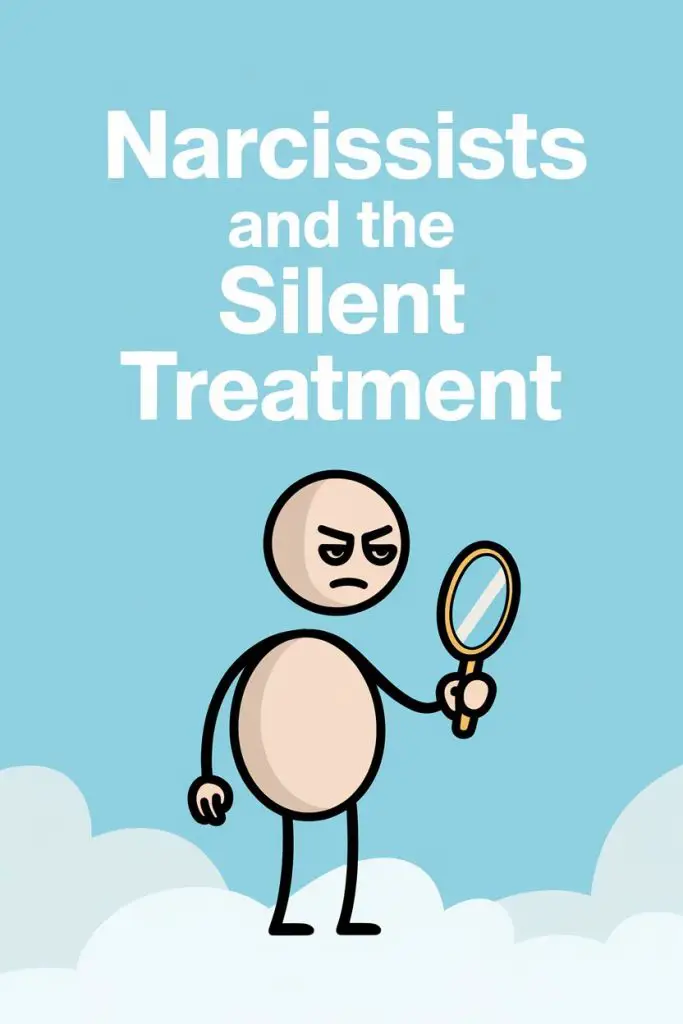Ever felt like your partner’s gone full ghost mode after a disagreement? You text, call, maybe even attempt semaphore from the living room, but all you get is radio silence.
If you’re tangled up with a narcissist, this icy wall isn’t just about cooling off—it’s a calculated move loaded with meaning.
Let’s unravel the chilly mystery behind narcissists and the silent treatment, and figure out how you can thaw those frosty vibes without losing your marbles.
What Silent Treatment Means to a Narcissist
When a narcissist goes quiet, it’s rarely about needing space to process feelings or reflect. For them, the silent treatment is a power move—a way of yanking control back into their court.
Silence isn’t just absence of words; it’s an emotional punishment. The narcissist isn’t quietly journaling their feelings or meditating—they’re showing you who’s boss.
This tactic is about making you uncomfortable, anxious, and desperate for their attention, so you’ll do anything to restore harmony (read: their comfort).
Why Narcissists Choose Silence Over Shouting
Arguments with a narcissist can be explosive, but sometimes they’ll choose silence over their usual fireworks. Why? Because silence can be more unsettling than an argument.
Nothing gets you scrambling for approval like a partner who suddenly acts like you’re invisible. This approach means the narcissist doesn’t even have to raise their voice to send you into a tailspin.
Silence allows them to dodge accountability for their actions, create ambiguity, and keep you on the back foot. It’s much harder to poke holes in a wall of silence than in someone’s angry rant.
How the Silent Treatment Keeps You Hooked
The emotional whiplash caused by the silent treatment is real. After a stretch of frosty distance, the narcissist might suddenly thaw, acting as if nothing happened.
This push-pull dynamic can train you to crave their approval.
It’s a bit like having a slot machine in your living room: sometimes you get nothing, sometimes you get a rush of attention. Eventually, you’ll do almost anything for that next “payout”—which, conveniently, keeps the narcissist right where they want you.
The Emotional Cost of Narcissistic Silence
You might start to question everything: Did I say something wrong? Am I being unreasonable? Maybe I’m too sensitive?
This is exactly where the narcissist wants you—doubting your own reality and making yourself smaller so you don’t risk a repeat freeze-out.
Prolonged silent treatment can chip away at your self-esteem, foster anxiety, and even make you forget what it feels like to have your emotions respected.
Some folks describe it as “walking on eggshells.” Others call it “living in a freezer aisle.” Either way, it’s exhausting.
Spotting the Difference Between Healthy Space and Narcissistic Silence
Not every bout of silence signals narcissism. Sometimes partners need time to cool off, especially after a heated exchange. The difference? Healthy space is communicated and temporary.
If your partner says, “I need an hour to clear my head, then we can talk,” you’re dealing with genuine self-care.
If they vanish into a cone of silence, ignore your attempts to connect, and act as if you don’t exist for days (or longer) while refusing to explain themselves—that’s the narcissistic version.
In a healthy relationship, space brings people back together. In a toxic dynamic, it just pushes you further apart.
Common Triggers for the Narcissist’s Silent Treatment
Narcissists dish out the silent treatment for a variety of reasons, all of which revolve around self-preservation and power:
- You’ve challenged their opinion or behavior.
- You didn’t show enough admiration or attention.
- You set a boundary they didn’t like.
- You dared to have your own needs.
Essentially, you’ve “disrespected” their ego. The silent treatment serves as a chilling reminder not to do it again.
Typical Reactions Victims Experience
The silent treatment messes with your head. Here’s what often happens:
- You feel panicked and desperate for reconnection.
- You over-apologize, even if you’re not sure what you did.
- You start monitoring your words and actions to avoid future “punishments.”
- You internalize blame, thinking you’re the problem.
It’s no accident. Narcissists depend on this cycle to keep you off balance and pliable.
What Not to Do When You’re Frozen Out
Getting the cold shoulder from a narcissist can make you want to bang your head into a wall—or send a flurry of texts worthy of a telenovela.
Resist the urge. Flooding them with apologies or explanations only reinforces their power. Don’t beg for a response or start a monologue on their doorstep.
The more you chase, the more they’ll retreat (and gloat about it internally).
And whatever you do, don’t start stonewalling back in revenge. Two wrongs won’t make a right (but they might make for an epic stand-off where nobody wins).
How to Respond When a Narcissist Uses Silence as a Weapon
You can’t control their behavior, but you can absolutely choose your response.
- Acknowledge your own feelings—frustration, sadness, anger. Name them.
- Avoid over-apologizing or groveling if you haven’t actually done anything wrong.
- Set a limit: “I see you’re upset and not ready to talk. I’ll be here to discuss it when you are. I’m not going to chase or guess.”
- Shift focus to your own well-being. Go for a walk, call a friend, or do something that reminds you you’re more than this moment.
- Document patterns if this keeps happening. Keeping notes can help you spot just how often this cycle occurs—which is especially helpful if you’re questioning your sanity.
Refusing to engage in the power game takes practice, but it’s the only way to stop feeding the cycle.
Setting Boundaries Around the Silent Treatment
Boundaries don’t have to be confrontational—they’re about protecting your sanity.
Try saying: “If you’re upset and need space, that’s okay. Please let me know when you’re ready to talk. I won’t tolerate being ignored for days.”
If the narcissist bristles? Stand firm. Boundaries may annoy them, but they’re your lifeline. You’re not asking for the moon—just basic respect.
If the silent treatment stretches on, decide what you’ll do for yourself. Will you leave the room? Go out with friends? Sleep in another room?
Your response should send a message: I will not be manipulated into silence or submission.
When to Seek Support
Prolonged silent treatments—especially when paired with other manipulative behaviors—can be emotionally harmful. Reaching out for support isn’t weakness; it’s basic self-care.
Connect with a trusted friend, therapist, or support group. Sometimes, just sharing your situation out loud can bring clarity and relief.
You deserve to be heard, even if your partner isn’t listening.
Is Change Possible?
Here’s a tough pill: Narcissists rarely change without serious motivation, and most don’t see anything wrong with their behavior.
Some will double down if you try to call them out or set boundaries. Others might make temporary improvements, only to slip back into old patterns.
The real question becomes: Are you willing to wait and hope for change that may never come, or would your energy be better spent prioritizing your own emotional health?
When the Silent Treatment Turns into Emotional Abuse
A single silent spell is unpleasant. Regular, sustained cold shoulders? That’s emotional abuse.
If you’re regularly walking on eggshells, afraid to speak up, or find your self-worth wrapped up in your partner’s approval, it’s time to take a long, hard look at the relationship.
Abuse isn’t always visible. Sometimes, it feels like a chill that never quite leaves the room.
Reclaiming Your Voice
The antidote to narcissistic silence is self-validation. Remind yourself: Your feelings are real. Your needs matter. You don’t have to jump through hoops to earn basic decency.
Start talking openly with trusted friends or a mental health professional. Practice self-care, even if your partner can’t (or won’t) give you what you need.
You might find that, with enough support and courage, you prefer the sound of your own laughter to the echo of someone else’s silent manipulation.
Thawing Out and Moving Forward
Narcissists wield the silent treatment like a cold war weapon—but you don’t have to surrender your happiness. Whether you stay or go, your peace of mind deserves to be front and center.
It’s not selfish to want warmth in your relationship; it’s human. The silent treatment might be their favorite trick, but it doesn’t have to work forever.
You can step out of the cold. And you absolutely deserve to.


